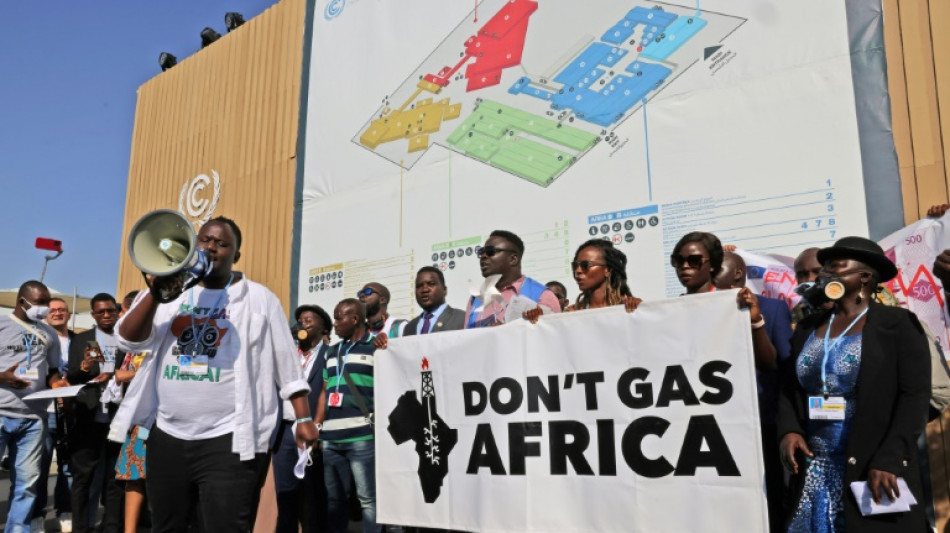

Rich, developing nations head toward climate compensation clash
Wealthy and developing countries set the stage Tuesday for a showdown at UN climate talks over demands for rich polluters to compensate vulnerable nations for damages caused by natural disasters.
The COP27 conference in Egypt has been dominated by calls for wealthy nations to provide financing to developing nations least responsible for global warming for deadly and costly climate impacts.
Ministers from some of the world's worst-hit countries admonished developed ones for not doing enough, not only on this issue but also on unfulfilled promises to provide $100 billion in annual aid for their green transitions.
At "how many COPs have we been arguing for urgent climate action? And how many more do we need, how many lives do we need to sacrifice?" Belize's Climate Change Minister Orlando Habet told COP27 delegates.
After dragging their feet on the issue of "loss and damage" for years over concerns it would create a reparations mechanism, the United States and European Union agreed to have it on the formal agenda at COP27.
But Western powers and a major group of developing nations allied with China presented widely different views of how to achieve this.
The G77+China bloc of more than 130 developing nations presented a document saying the need for a special "loss and damage" fund was "urgent and immediate".
How much money would be put into the fund, and where it would come from it left unsaid, but the G77+China said it should be operational in time to be approved at next year's COP28 in Dubai.
The United States and the European Union have suggested that expanding current channels for climate finance might be a more efficient approach than creating a new one.
In its own "talking points" on Tuesday, the EU recognised "the need and urgency" for loss and damage funding, and that "current financing mechanisms are not able to cover all necessary actions."
But rather than creating a new facility in Sharm el-Sheikh, they favour calling in the two-week meeting's final declaration for the launch of a time-bound process to explore a "mosaic of solutions".
The first draft of COP27's final declaration -- which must be approved by all parties -- echoes language previously deployed by the US and Europeans proposing "funding arrangements" for loss and damage.
European Commission Vice President Frans Timmermans told reporters that the EU has "demonstrated openness to discuss moving forward on loss and damage", but he said "he was not quite sure we would be able this week to find consensus on the new financial mechanism".
- Major emitter 'hypocrisy' -
With COP27 scheduled to end on Friday and several items left unresolved, Egyptian Foreign Minister Sameh Shoukry, the COP27 president, said it was "clear that some issues require further technical work".
"Progress has been made, but certainly more remains to be done if we are to achieve the robust outcomes that will drive ambitious, and inclusive climate action," he told delegates.
Conrod Hunte of Antigua and Barbuda, lead negotiator for the Alliance of Small Island States, said it would be a "devastating blow" if talks stalled.
"Antigua and Barbuda will not leave here without a loss and damage fund," he said.
Shawn Edward, sustainable development minister of Saint Lucia, said the people of his Caribbean islands suffer the consequences of the "hypocrisy" of major emitters that continue to invest in fossil fuels.
COP27 comes as global CO2 emissions are poised to reach an all-time high this year, making the aspirational goal of limiting warming to 1.5 degrees Celsius compared to preindustrial levels ever more elusive.
- EU raises emissions target -
Timmermans told delegates that the EU would outperform its original plan to reduce its greenhouse gas emissions by 55 percent by 2030.
The 27-nation bloc will now be able to cut those emissions by 57 percent from 1990 levels, he said, pointing to agreements on phasing out fossil fuel-powered cars and protecting forests that serve as "carbon sinks".
"The European Union is here to move forwards, not backwards," Timmermans told COP27 delegates.
The invasion of Ukraine by energy exporter Russia has cast a shadow over the talks in Egypt, with activists accusing Europeans of seeking to tap Africa for natural gas following Russian supply cuts.
But Timmermans denied the bloc was in a "dash for gas" amid the Ukraine conflict.
"Don't let anybody tell you, here or outside, that the EU is backtracking," he said.
Watchdog groups were unimpressed.
"This small increase announced today at COP27 doesn't do justice to the calls from the most vulnerable countries at the front lines," said Chiara Martinelli, of Climate Action Network Europe.
L.Amato--IM




